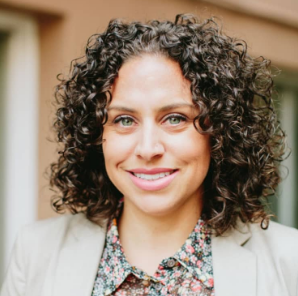
Engage San Francisco’s Mind, Body and Soul

Dr. Lisa De La Rue is an Assistant Professor in the Counseling Psychology Department, where she also serves as the fieldwork coordinator for the Marriage and Family Therapy program.
Eat fruits and vegetables, get enough sleep and exercise regularly. We are all familiar with the common pieces of advice to promote wellness, and to fight off physical diseases. If we actually follow that advice … well that is another question. But what can you do to prevent depression? How do you cope with difficult life experiences? How do you manage symptoms of anxiety? Fewer people would have ideas on how to address these needs, despite the reality that millions of adults and children experience mental illness in a given year. Many cannot answer this question because we largely keep conversations about mental illness in the shadows, where it takes on a certain taboo, a stigma that we do not see when talking about physical ailments. As a result many people do not know what to do when they or someone they love is suffering from mental health concerns, let alone know where to access services.
As a psychologist, and a professor who works to train the next generation of clinicians, I am constantly thinking about how to raise awareness of mental health and to increase knowledge around how to access support services. According to the National Alliance on Mental Illness, approximately 1 in 5 adults experience mental illness in a given year, and 1 in 25 adults will experience a serious mental illness that will interfere with their ability to engage in one or more life activities (e.g. work, being with friends or family, going to school). Additionally, 1 in 5 young people between the ages of 13 and 18 will experience a severe mental illness within a given year. Despite these numbers, too many people do not receive the treatment or support they need to get better, and just like with a physical disease, untreated mental health concerns can get worse.
We know that one of the barriers to people receiving the support they need is a result of the stigma associated with mental illness. Name-calling, derogatory terms, and dramatized negative portrayals of people with mental illness all contribute to an atmosphere where people may be reluctant to share their struggles or to seek out support. Part of addressing this stigma is to increase awareness of mental health and illness. Another barrier to addressing mental health concerns is a lack of awareness around where to access services. Some people may not realize that mental health treatment can address the symptoms they are experiencing. For others, they may know treatment is needed but do not know where to look for these services.
Addressing these barriers is an essential component of ensuring people with mental health concerns get the support they need and have the opportunity to live healthier and happier lives. The Mind, Body and Soul Pop-Ups provide an example of how to address these exact barriers.
Engage San Francisco’s Mind, Body, and Soul Pop-Ups are community based resource fairs that bring together service providers from across the Western Addition. These Pop-Ups provide community members with information on services available in their community, and educational materials on how to promote physical, mental and spiritual wellness. Spaces like these provide a wonderful avenue in which to increase awareness of mental health and treatment, in manner that feels safer. For example, someone can come in to gather information on nutrition, and then casually wonder to the next table where information is being provided about depression. Not only does this format increase the number of people who are provided with information, but can also allows those who may feel stigmatized to gather information in a manner that is less overwhelming. Having conversations about mental illness, and wellness, alongside conversations about managing diabetes helps reduce stigma around mental health treatment and places it in the realm of diseases that can be treated. And indeed this is the realm in which it belongs.
As we continue to have conversations about mental wellness in the Western Addition, the hope is that some of the stigma around mental illness will be reduced. This can allow more people to feel comfortable seeking out support, which can help prevent a mental illness from getting worse. However, reducing stigma is just one part of the puzzle; people also need to know where they can access treatment. Events like the Mind, Body, and Soul Pop-Ups and efforts like the San Francisco Human Rights Commission’s program Black to the Future are wonderful examples of how to raise awareness of services that are available, and to encourage people to access these programs.
Mental illness is a disease that does not discriminate. It knows no age limits, and impacts people across racial, ethnic, and economic backgrounds. It is also a disease that often responds well to treatment and interventions. As such, community engaged efforts are essential to ensure that people can access the mental support services they need, and do not feel shame in doing so.
The next Mind, Body and Soul event is on June 29th! Check out photos from February’s Mind, Body and Soul event here.
